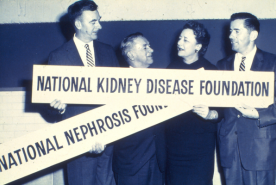October 30, 2023
Open enrollment for Medicare Advantage is upon us and it’s important that kidney patients get all the information as they make decisions that will affect their care. Below are some important FAQs and other factors for you to think about as you consider your options.
What is the difference between Medicare Advantage and regular Medicare?
Traditional Medicare
Traditional Medicare, (sometimes called fee-for-service), is the federal health insurance program for Americans aged 65+, those with end-stage renal disease (ESRD), or specific disabilities. It comprises three parts: Part A for hospital stays, Part B for outpatient care, and Part D for prescription drugs. Find detailed information on costs and coverage here.
While most providers participate, gaps in coverage and out-of-pocket expenses may arise. Many turn to Medigap plans, though they may not be accessible for younger ESRD patients. Explore Medigap options in your area visit here.
Medicare Advantage and Prescription Drug Plans
Medicare Advantage (MA) plans are private plans that contract with Medicare to provide you with all your Part A and Part B benefits. MA plans are similar to commercial insurance plans that you might get from your employer or in the individual market and they use a lot of the same tools (e.g., provider networks, formularies, co-pays, etc.) to manage care and keep costs low.
MA plans often extend additional benefits like prescription drug coverage, dental, and transportation. Understanding the scope of coverage is vital, as some plans may restrict travel and insurance coverage outside your network.
Medicare Prescription Drug Plans (PDPs or Part D) are private plans that cover only your prescription drugs. It is important that kidney patients carefully review these plans to ensure access to essential drugs for kidney health, their transplant, and overall health care needs.
What should kidney patients look for when exploring their options?
Kidney patients experience a lot of healthcare needs, many of which will vary depending on where they are in their disease trajectory. People who have earlier-stage chronic kidney disease (CKD) might still be learning how to manage their CKD while balancing comorbidities. People with kidney failure will have a different set of needs they should consider, and people seeking or recovering from a transplant might be worried about a completely different set of issues.
Here are some specific things to explore when reviewing plans
Does the plan cover my specific kidney medications?
- MA plans and Prescription Drug plans to rely on tools like formularies, tiered pricing, “step-through” therapy, and other utilization controls to keep drug prices low. Patients are also usually responsible for a co-pay for their prescription drug costs as well. These expenses can really add up, so it’s important to know whether your routine prescriptions will be covered.
- Because kidney patients often take multiple medications, it can be challenging to find a plan that works for you. Below are some (but not all) common medications that are used to treat CKD and its complications. Check with your plan, your physician, and your pharmacist to see what your options and considerations might be:
- Common CKD Drugs:
- Empagliflozin (Jardiance)
- Dapagliflozin (Farxiga)
- Cangliflozini (Invokana)
- Finerenone (Kerendia)
- Common Immunosuppressants:
- Prednisone
- Tacrolimus (Prograf)
- Cyclosporine (Neoral)
- Mycophenolate Mofetil (CellCept)
- Imuran (Azathioprine)
- Rapamune (Rapamycin, Sirolimus)
- Common Diabetes Drugs:
- Dulaglutide (Trulicity)
- Exenatide (Byetta)
- Exenatide extended-release (Bydureon BCise)
- Liraglutide (Saxenda, Victoza)
- Lixisenatide (Adylyxin)
- Semaglutide (Ozempic)
- Tirzepatide (Mounjaro)
- Provider networks:
- Verify if your preferred specialists are in-network while reviewing plans. Check coverage for primary care, nephrologists, endocrinologists, cardiologists, dialysis and transplant centers, as well as transplant surgeons."
- Supplemental benefits:
- Many MA plans provide ‘supplemental benefits’ that include services not covered under traditional Medicare or even by other health plans. Services to look out for include:
- Transportation
- Dental care. Vision care and glasses
- Audiology and hearing aids
- Groceries or “meals on wheels”
- Health club memberships
- Many MA plans provide ‘supplemental benefits’ that include services not covered under traditional Medicare or even by other health plans. Services to look out for include:
Don't forget to check for restrictions.
Where can you find resources?
- Visit https://www.medicare.gov/ for comprehensive details.
- Seek advice from your healthcare providers, including social workers who can help you navigate insurance options. Additionally, connect with fellow patients to gain other insights into dealing with unexpected bills, plan responsiveness, and coverage challenges.









